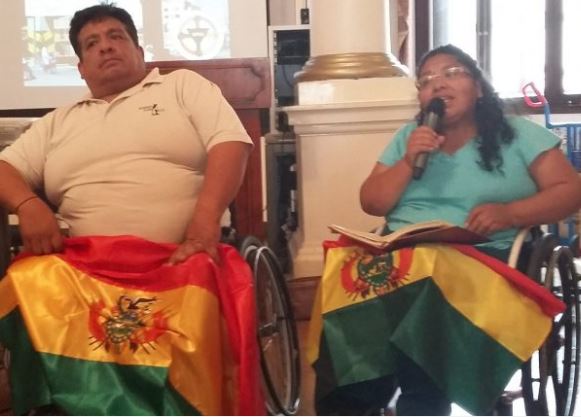
In July we were delighted to meet Feliza Ali Ramos and Marcelo Vásquez, disability campaigners from the organisation New Hope in Bolivia, at the alternative international solidarity summit, and later the festival of resistance against the hypocrisy of the UK government’s Global Disability Summit.
The courageous and imaginative Bolivian disability movement fighting for a living benefit gives a lead to everyone. Watch the gripping film of their 2016 struggle here.
After dramatic actions in the city of Cochabamba were ignored, disabled people and their supporters embarked on a gruelling 300-mile march through the Andes mountains to the capital La Paz.

Speaking at the alternative conference in London in July, Feliza said that the benefit used to be the equivalent of £10/month, they demanded £56/month (500 Bolivianos) and eventually won agreement to pay £25 in 2017. The benefit is paid through local councils.
As a Quechua woman, she was a supporter of Evo Morales, the first indigenous President of Bolivia (whose background is in trade union and rural people’s campaigns) until his government brutally repressed their people and tried to disrupt their campaign in many ways.
Watch her and Marcelo’s speeches here, starts at 20 mins along: https://www.facebook.com/ROFAcampaign/videos/1777872452288731/
Campaigners also object to the disability benefit test, which in Bolivia is based on percentage of disability. People are often under-assessed so get less money, and in any case cannot afford the equipment, medication or treatment they need, so die prematurely.
A previous long march by disabled people in 2012 had also been met with police violence.
Cochabamba people are famous for their successful struggle against water privatisation. In 1999, as part of mass privatisation of the national resources of Bolivia demanded by the IMF and World Bank, water was handed over to the US company Bechtel. Local people had to buy water — collecting rainwater was made illegal. The “Water War” led to a change of government. Water is now renationalised, but in places, the water source is grabbed by mining companies, creating water scarcity in communities, devastating the environment and destroying women’s small-scale farming and keeping of llamas.
